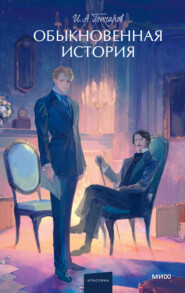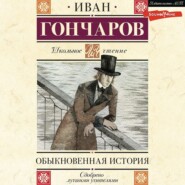По всем вопросам обращайтесь на: info@litportal.ru
(©) 2003-2025.
✖
Oblomov / Обломов. Книга для чтения на английском языке
Настройки чтения
Размер шрифта
Высота строк
Поля
«You never know anything! Look there – in the waste-paper basket! Or perhaps it has dropped behind the sofa? Look at the back of that sofa – hasn’t it been repaired yet? Why don’t you send for the carpenter and have it repaired? It was you who broke it, wasn’t it? You never think of anything!»
«It wasn’t me that broke it, sir», replied Zakhar. «It broke by itself. Can’t last for ever, can it? It’s bound to get broken some day».
Oblomov did not think it necessary to contest the point.
«Haven’t you found it yet?» he merely asked.
«Here are some letters, sir».
«That’s not it».
«Well, sir, there ain’t no more», Zakhar said.
«Very well, you can go», Oblomov said impatiently. «I’ll look for it myself when I get up».
Zakhar went back to his room, but he was just about to lay his hands on the stove in order to jump on to it, when he again heard a hurried call:
«Zakhar! Zakhar!»
«Oh Lord!» Zakhar growled, as he went into the study again. «What a trial he is! I wish I was dead!
„What is it now, sir?“ he asked, holding on to the door of the study with one hand, and, to show his extreme disapproval, looking at Oblomov at such an angle that he could see his master only out of the corner of his eye, while his master could only see one of his vast side-whiskers, out of which, it would seem, two or three birds might fly at any moment.
„My handkerchief, and be quick about it! You might have thought of it yourself – you never see anything!“ Oblomov observed sternly.
Zakhar showed no sign of any particular displeasure or surprise at his master’s command and reproach, no doubt finding both quite natural.
„How should I know where your handkerchief is?“ he grumbled, walking round the room and feeling every chair with his hand, though one could see there was nothing lying there.
„You’re always losing things“, he observed, opening the drawing-room door to see if the handkerchief was there.
„Where are you going? Look for it here! I haven’t been there since the day before yesterday. And hurry up, will you?“ Oblomov said.
„Where is that handkerchief? Can’t see it anywhere!“ said Zakhar, throwing up his hands and looking round the room. „Why, there it is“, he suddenly hissed angrily. „It’s under you, sir! There’s one end of it sticking out! You lie on your handkerchief and then you ask for it!“
And, without waiting for a reply, Zakhar was about to leave the room. Oblomov felt a little disconcerted by his own mistake. But he quickly found another reason for putting the blame on Zakhar.
„Is this the way you keep the place clean and tidy? Look at the dust, the dirt – good Lord! There – have a look in the corners – you don’t do anything!“
Don’t I, sir?» Zakhar said in a hurt voice. «As if I wasn’t trying. Working my fingers to the bone, I am. Dusting and sweeping nearly every day».
He pointed to the middle of the floor and the table at which Oblomov had dinner.
«Look there, sir, there», he said; «everything’s swept up and tidy as for a wedding. What more do you want?»
«And what’s this?» Oblomov interrupted him, pointing to the walls and the ceiling. «And this! And this!»
He pointed to the towel left on the sofa since the day before and to a plate with a piece of bread on it, forgotten on the table.
«Well, sir, I daresay I might take this away», said Zakhar, picking up the plate with a condescending air.
«Only that? And what about the dust on the walls – the cobwebs?» Oblomov said, pointing to the walls.
«I usually sweep the walls before Easter, sir. I clean the icons then, too, and take off the cobwebs».
«And the books and pictures – when do you dust them?»
«The books and pictures, sir, I do before Christmas: Anisya and I turn out all the book-cases then. How do you expect me to clean the place now? You’re at home all day, aren’t you?»
«I sometimes go to the theatre or visit friends – that’s when you ought to do it».
«Can’t do things at night, can I, sir?»
Oblomov gave him a reproachful look, shook his head, and sighed. Zakhar cast an indifferent glance out of the window and sighed, too. The master seemed to think: «Well, my dear chap, you’re even more of an Oblomov than I am». And Zakhar, quite likely, thought to himself: «Fiddlesticks! All you’re good at is to use high-sounding and aggravating words – you don’t care a fig for the dust and the cobwebs!»
«Don’t you realize», said Oblomov, «that moths thrive on dust? And sometimes I can even see a bug on the wall!»
«I’ve got fleas as well, sir», Zakhar remarked unconcernedly.
«You think that’s all right, do you?» Oblomov said. «Why, it’s vermin!»
Zakhar grinned all over his face, so that his eyebrows and side-whiskers parted, and a red flush spread all over his face.
«Isn’t my fault, sir, if there are bugs in the world», he said with naive surprise. «I didn’t invent them, did I?»
«It’s because of the dirt», Oblomov interrupted him. «What nonsense you do talk!»
«I didn’t invent dirt, either».
«You’ve got mice running about in your room at night – I can hear them».
«I didn’t invent the mice, either. There are lots of these creatures everywhere, sir: mice and moths and bugs».
«How is it other people have neither moths nor bugs?»
Zakhar’s face expressed incredulity, or rather a calm certainty that this never happened.
«I’ve got lots of everything, sir», he said obstinately. «You can’t expect me to see to every bug. I can’t crawl into their cracks, can I?»
He seemed to be thinking to himself: «And what would sleep be like without a bug?»
«Sweep up the dirt out of the corners – then there won’t be any», Oblomov instructed him.
«Sweep it up to-day and there’ll be plenty of it to-morrow», said Zakhar.
«No, there won’t», his master interrupted him. «There shouldn’t be».
«There will be», the servant insisted; «I know, sir».
«It wasn’t me that broke it, sir», replied Zakhar. «It broke by itself. Can’t last for ever, can it? It’s bound to get broken some day».
Oblomov did not think it necessary to contest the point.
«Haven’t you found it yet?» he merely asked.
«Here are some letters, sir».
«That’s not it».
«Well, sir, there ain’t no more», Zakhar said.
«Very well, you can go», Oblomov said impatiently. «I’ll look for it myself when I get up».
Zakhar went back to his room, but he was just about to lay his hands on the stove in order to jump on to it, when he again heard a hurried call:
«Zakhar! Zakhar!»
«Oh Lord!» Zakhar growled, as he went into the study again. «What a trial he is! I wish I was dead!
„What is it now, sir?“ he asked, holding on to the door of the study with one hand, and, to show his extreme disapproval, looking at Oblomov at such an angle that he could see his master only out of the corner of his eye, while his master could only see one of his vast side-whiskers, out of which, it would seem, two or three birds might fly at any moment.
„My handkerchief, and be quick about it! You might have thought of it yourself – you never see anything!“ Oblomov observed sternly.
Zakhar showed no sign of any particular displeasure or surprise at his master’s command and reproach, no doubt finding both quite natural.
„How should I know where your handkerchief is?“ he grumbled, walking round the room and feeling every chair with his hand, though one could see there was nothing lying there.
„You’re always losing things“, he observed, opening the drawing-room door to see if the handkerchief was there.
„Where are you going? Look for it here! I haven’t been there since the day before yesterday. And hurry up, will you?“ Oblomov said.
„Where is that handkerchief? Can’t see it anywhere!“ said Zakhar, throwing up his hands and looking round the room. „Why, there it is“, he suddenly hissed angrily. „It’s under you, sir! There’s one end of it sticking out! You lie on your handkerchief and then you ask for it!“
And, without waiting for a reply, Zakhar was about to leave the room. Oblomov felt a little disconcerted by his own mistake. But he quickly found another reason for putting the blame on Zakhar.
„Is this the way you keep the place clean and tidy? Look at the dust, the dirt – good Lord! There – have a look in the corners – you don’t do anything!“
Don’t I, sir?» Zakhar said in a hurt voice. «As if I wasn’t trying. Working my fingers to the bone, I am. Dusting and sweeping nearly every day».
He pointed to the middle of the floor and the table at which Oblomov had dinner.
«Look there, sir, there», he said; «everything’s swept up and tidy as for a wedding. What more do you want?»
«And what’s this?» Oblomov interrupted him, pointing to the walls and the ceiling. «And this! And this!»
He pointed to the towel left on the sofa since the day before and to a plate with a piece of bread on it, forgotten on the table.
«Well, sir, I daresay I might take this away», said Zakhar, picking up the plate with a condescending air.
«Only that? And what about the dust on the walls – the cobwebs?» Oblomov said, pointing to the walls.
«I usually sweep the walls before Easter, sir. I clean the icons then, too, and take off the cobwebs».
«And the books and pictures – when do you dust them?»
«The books and pictures, sir, I do before Christmas: Anisya and I turn out all the book-cases then. How do you expect me to clean the place now? You’re at home all day, aren’t you?»
«I sometimes go to the theatre or visit friends – that’s when you ought to do it».
«Can’t do things at night, can I, sir?»
Oblomov gave him a reproachful look, shook his head, and sighed. Zakhar cast an indifferent glance out of the window and sighed, too. The master seemed to think: «Well, my dear chap, you’re even more of an Oblomov than I am». And Zakhar, quite likely, thought to himself: «Fiddlesticks! All you’re good at is to use high-sounding and aggravating words – you don’t care a fig for the dust and the cobwebs!»
«Don’t you realize», said Oblomov, «that moths thrive on dust? And sometimes I can even see a bug on the wall!»
«I’ve got fleas as well, sir», Zakhar remarked unconcernedly.
«You think that’s all right, do you?» Oblomov said. «Why, it’s vermin!»
Zakhar grinned all over his face, so that his eyebrows and side-whiskers parted, and a red flush spread all over his face.
«Isn’t my fault, sir, if there are bugs in the world», he said with naive surprise. «I didn’t invent them, did I?»
«It’s because of the dirt», Oblomov interrupted him. «What nonsense you do talk!»
«I didn’t invent dirt, either».
«You’ve got mice running about in your room at night – I can hear them».
«I didn’t invent the mice, either. There are lots of these creatures everywhere, sir: mice and moths and bugs».
«How is it other people have neither moths nor bugs?»
Zakhar’s face expressed incredulity, or rather a calm certainty that this never happened.
«I’ve got lots of everything, sir», he said obstinately. «You can’t expect me to see to every bug. I can’t crawl into their cracks, can I?»
He seemed to be thinking to himself: «And what would sleep be like without a bug?»
«Sweep up the dirt out of the corners – then there won’t be any», Oblomov instructed him.
«Sweep it up to-day and there’ll be plenty of it to-morrow», said Zakhar.
«No, there won’t», his master interrupted him. «There shouldn’t be».
«There will be», the servant insisted; «I know, sir».

















